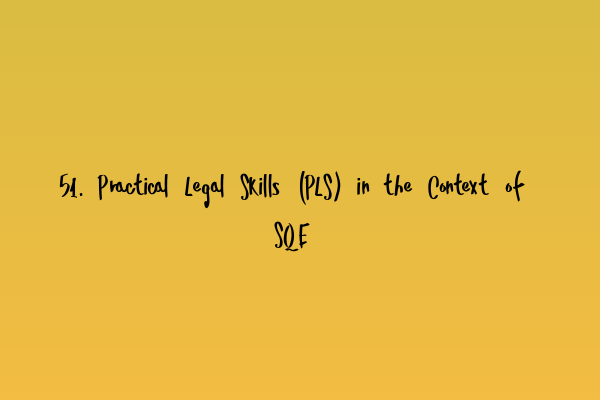51. Practical Legal Skills (PLS) in the Context of SQE
When it comes to preparing for the Solicitors Qualifying Examination (SQE), there is no doubt that a deep understanding of legal knowledge is essential. However, it is equally important to develop practical legal skills (PLS) that will not only help you succeed in the exams but also in your future career as a solicitor.
So, what exactly are practical legal skills? PLS encompasses a range of abilities that are crucial for a solicitor to excel in their profession. These skills include legal research, drafting legal documents, client interviewing, negotiation, advocacy, and more. It is these practical skills that allow solicitors to effectively apply their legal knowledge and provide effective legal advice to their clients.
Now, you might be wondering how to acquire these practical legal skills and how they are tested in the SQE. Let’s delve deeper into this topic to understand the significance of PLS in the context of the SQE.
Acquiring Practical Legal Skills
Developing practical legal skills is a continuous process that starts in law school and extends throughout a solicitor’s career. While law schools provide a foundation for these skills, additional training and real-world experience are necessary to truly master them.
One way to acquire practical legal skills is through SQE preparation courses offered by recognized course providers. These courses are specifically designed to help aspiring solicitors develop their PLS and provide comprehensive training in areas such as legal research, legal writing, and client communication. Additionally, many course providers offer simulated exercises and practical scenarios that allow candidates to practice and hone their skills.
Another valuable resource for acquiring practical legal skills is webinars. SQE webinars, such as the ones offered by SQE Exam Law, provide expert insights and practical advice from experienced solicitors. These webinars cover various topics related to PLS, including legal drafting, negotiation techniques, and advocacy skills. By attending these webinars, you can gain valuable knowledge and tips from legal professionals with real-world experience.
To further enhance your practical legal skills, it is advisable to seek opportunities for work experience or internships at law firms. This hands-on experience will allow you to apply your legal knowledge in real-life situations and develop a deeper understanding of how legal principles are applied in practice.
Testing Practical Legal Skills in the SQE
The SQE is designed to assess both legal knowledge and practical legal skills. The assessment of PLS takes place in two stages: the Skills Assessment and the Functioning Legal Knowledge Assessment (FLK). These assessments aim to evaluate candidates’ ability to apply legal knowledge in practical situations.
The Skills Assessment consists of simulated exercises and practical scenarios that test candidates’ abilities in areas such as legal drafting, legal research, client interviewing, negotiation, and advocacy. This assessment is conducted in a controlled environment, allowing candidates to demonstrate their PLS under exam conditions.
On the other hand, the FLK assessment incorporates practical legal skills into the context of legal knowledge questions. Candidates are presented with scenarios that require them to analyze and apply legal principles to solve various legal problems. This assessment ensures that candidates can effectively apply their legal knowledge in practical situations.
Understanding how practical legal skills are tested in the SQE is crucial for a successful exam preparation strategy. By focusing on developing both legal knowledge and practical skills, you can maximize your chances of acing the exams and succeeding in your future legal career.
Why Practical Legal Skills Matter
Practical legal skills are not only important for passing the SQE but also for succeeding in your career as a solicitor. While legal knowledge forms the basis of your expertise, it is the practical application of this knowledge that sets you apart.
Clients seek solicitors who can efficiently analyze their legal problems, provide sound legal advice, and effectively communicate and negotiate on their behalf. The ability to apply legal principles in practical situations is what makes a solicitor valuable to their clients.
Moreover, as the legal profession continues to evolve, solicitors must adapt to changing norms and technologies. Practical legal skills, such as legal research and technological literacy, are crucial for staying ahead in the ever-changing legal landscape.
In conclusion, developing practical legal skills is an essential part of preparing for the SQE and building a successful career as a solicitor. By focusing on both legal knowledge and practical skills, you can enhance your chances of success in the exams and stand out as a competent and effective legal professional.
For more information on preparing for the SQE and developing your practical legal skills, check out the following related articles:
- 24. Unlocking Knowledge with SQE Webinars: Expert Insights at Your Fingertips
- 17. Review of SQE Course Providers: Choosing the Best Fit
- 4. Unveiling the SRA Syllabus for the SQE
- 31. Conquer the SQE: Insider Tips and Study Tricks for Success
- Grading System in SQE: Understanding How Exams are Evaluated
